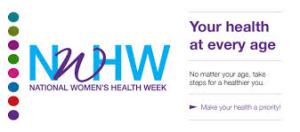Happy Holidays! It’s that time of year again when we spend our days shopping for gifts, running from place to place trying to catch the best deals to put a smile on the face of those we love! While it is an exciting time, it can also be time that we neglect the most precious gifts we already have, our families, especially our children. While we are taking care of holiday business let’s find ways to keep our family and children knowing how special they are to us. Continue reading “Don’t forget that “good tidings of comfort and joy” applies to you too”
2016: A Year in Review and A Look Forward
The theme of 2016 at ESNG was expansion. We expanded our programs, reach, events and accreditations. Let’s take a look back at what we did as we get ready for a fun and exciting 2017.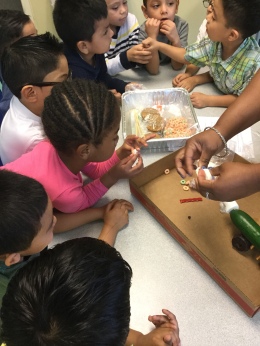
STEM
Last year, we piloted the innovative STEM in early education at our Brookvalley location. Thanks to funding from the Sibley Award and Frances Hollis Brain Foundation, we are expanding the program to our Guice, Mansell and Warsaw locations.
 Continue reading “2016: A Year in Review and A Look Forward”
Continue reading “2016: A Year in Review and A Look Forward”
Tips to Make School Transition Easier
I know it’s hard to believe, but the new school year is right around the corner (if it hasn’t started yet). ESNG’s Early Childhood Mental Health Manager Dr. Juanita Brigman offers some advice to help you and your young child have an easy transition as he/she starts preschool.
Weeks before starting school:
- If your child had a later bedtime during the summer, help him/her get into a preschool schedule by keeping to his school bedtime about 2 weeks before school starts.
- Read books about starting school. Here is a list of recommendations.
- Visit the school and let the child tour the classroom and meet the teacher.
The night before the first day:
- Let your child choose (weather- and school-appropriate) clothes for her first day.
- Pick a bedtime that gives your child a good night’s rest before the first day. Keep the bedtime routine soothing and relaxing. Don’t focus too much (or at all!) on the first day of school unless he wants to.
- Have a nutritious breakfast that helps your child focus on fun not hunger.
The morning of the first day:
- Children pick up on the reactions of the trusted adults in their lives. So try not to look worried or sad, and don’t linger too long. Say a quick, upbeat good-bye and reassure your child that all will be well.
- Think about creating a special good-bye routine. For example, you can give your child a kiss on the palm to “hold” all day long. Or, the two of you can sing a special song together before you leave. Good-bye routines are comforting to children and help them understand and prepare for what will happen next.
- When you enter the classroom on the first day, calmly reintroduce the teacher to your child, then step back to allow the teacher to begin forming a relationship with your child. Your endorsement of the teacher will show your child that he or she will be happy and safe in the teacher’s care.
Resources:
https://www.zerotothree.org/resources/78-preschool-prep-how-to-prepare-your-toddler-for-preschool
Raising healthy children – inside and out
Successful early learning and development systems must include a strong and well-financed Infant-Early Childhood Mental Health component. – Zero to Three
When most people think of addressing mental health issues, we often think of disorders that affect older children and adults. However, we cannot ignore the importance of the social and emotional well-being of our youngest children.
According to Zero to Three, “Infant-early childhood mental health, sometimes referred to as social and emotional health, is the developing capacity of the child from birth to 5 years of age to form close and secure adult and peer relationships; experience, manage, and express a full range of emotions; and explore the environment and learn – all in the context of family, community, and culture.”
How can we help foster healthy social and emotional well-being of our children?
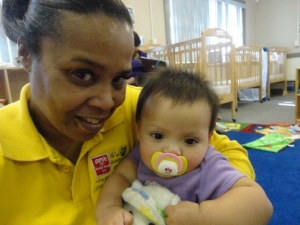
For newborns:
- Spend as much time as possible with your baby by wearing her in a sling or carrier, rocking her on your lap, or singing her a song. Your voice and touch can be very comforting.
- Try making skin-to-skin contact with your newborn. This practice, called “kangaroo care,” is often used in premature babies, but studies are finding that it’s also calming to babies born full-term.
- If a few months have passed and you’re worried that you still haven’t bonded with your baby, talk to your pediatrician. He or she can determine whether a psychological or health issue may be the cause of the problem.
Courtesy of Webmd.com
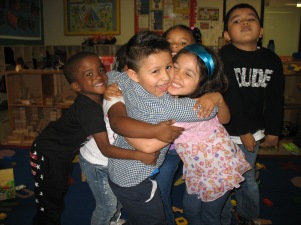
For toddlers:
- Encourage pals and playmates – A good place to start when helping your children to foster social skills is to encourage them to make friends and to bring them over. A toddler may require you to deliberately organize play dates where he can meet andplay with kids his age.
- Keep talking to your child – Proper communication, expression of feelings and thoughts are essential social skills. A family where children are encouraged to talk, express their feelings and to openly air their opinion is likely to bring up confident children and adults. Ensure that your kids feel safe talking to you about anything and more so, about their experiences with their peers. Encourage conversations at dinner time, ask your children how their day was, and tell them stories. Just keep the talk going in the house so your children learn good communication skills. At the same time, be a good listener and encourage them to listen to others.
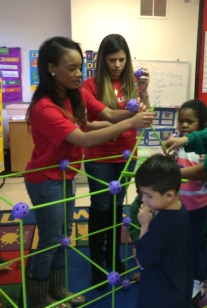
For older children:
- Teach How to Solve Problems- Eileen Kennedy-Moore, Ph.D., author of Smart Parenting for Smart Kids: Nurturing Your Child’s True Potential asserts that teaching social skills entails showing your child how to evaluate other people’s behaviour. Children usually end up in conflicts with their peers and other people because they misunderstood the other person’s behaviour. In teaching your child how to relate with others, encourage her to empathize and look at issues from a different perspective. ‘Why did Erika refuse to play with me?’ Could it be that she was in a bad mood, could it be that she has not forgiven me for shoving her yesterday? Could it be that she just wanted to be alone? It is also important to teach your child to focus less on the problem and more on finding solutions to avoid unnecessary conflicts.
- Foster an Environment of Tolerance – To get along well with others, it is important to have a sense of tolerance. Teaching tolerance starts in your home and with you as a role model. Do you make discriminatory remarks about others? Do you use harsh remarks such as “I hate people who…”; do you discourage your children from playing with other children because they are “different” from them? The world, and indeed, local neighbourhoods are cosmopolitan, filled with people from different walks of life. It is important to teach your child how to accept these differences, to look beyond them and to relate courteously with people regardless of their differences.
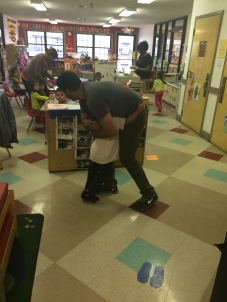
For all our children:
From ESNG’s very own Mental Health Manager, Dr. Juanita Brigman, “During the day today, if you can remember, reach out to our little ones and give them a hug. You never know, you just may be healing an emotional pain in their little hearts, or instilling confidence and courage they did not have, or giving them hope for another day, all because you took the time to give them a hug.”
For more information on ESNG’s early childhood mental health program, click here.
2015 – A Year in Review at ESNG
In 2015, Easter Seals North Georgia experienced thrilling change, impactful partnerships, life-changing stories, a monumental anniversary and many inspiring milestones that will carry us into 2016 ready to support and educate more children with and without disabilities and their families. Join us!
*The following is listed in no particular order
- On May 26, ESNG President/CEO Donna Davidson was recognized by Easter Seals national with the Myrtle M. and Tom B. Medder’s Award at the 2015 Leadership Summit awards dinner in Chicago. Read more.
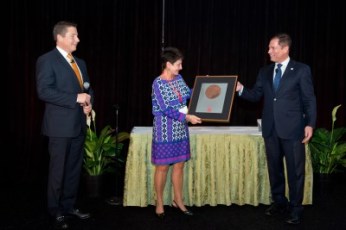
2. STEM – The 2015-16 school year started off with a new project for our students at Brookvalley. Children ages three to five enrolled at the child development center are learning Science, Technology, Engineering and Mathematics through a creative and hands-on curriculum. This first-of-its-kind program geared toward preschoolers will ensure they are on par with their peers as they enter kindergarten. 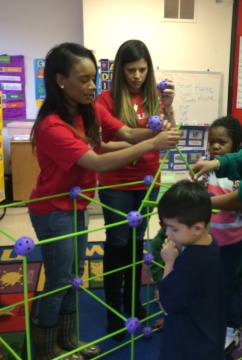
3. The Clark and Ruby Baker Foundation graciously gifted us with a grant for the Champions for Children program. This program supports families who do not qualify for the Katie Beckett Waiver and face high medical bills. Read more about this program.
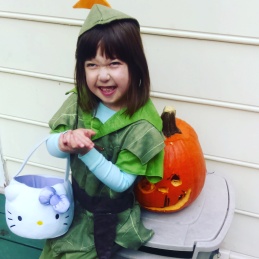
4. One of the strengths of ESNG is our partnerships. We are super excited about our newest one with the Marcus Autism Center. The prevalence of autism spectrum disorder has greatly increased. Fortunately children who are diagnosed early and receive effective treatments early have been showing remarkable improvements. We are piloting a new screening tool that is proving to be more sensitive to identifying children with possible ASD diagnoses. Read more about our ASD program.
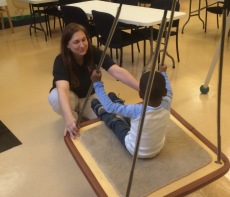
5. The Georgia Health Foundation awarded us with a grant to expand our autism spectrum disorder program in metropolitan Atlanta and Northeast Georgia. Funds from this award will us provide evidence-based therapies to children in their homes. Therapies through the PLAY Project center around the child’s everyday activities and involve the entire family. Read more about our ASD program.
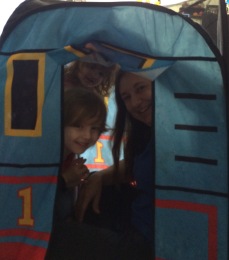
6. Our biggest annual fundraiser, Trick or Treat Trot, was a huge success. Around 500 runners, walkers, families and supporters came out to the Infinite Energy Arena to help us raise funds and awareness for children with disabilities. Photos from the event.
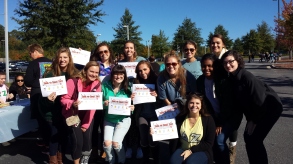
7. Easter Seals North Georgia’s child development center at Sylvan Hills received the Sibley Award to fund a new project that engages families in their children’s education. Read more about our early education and care program.
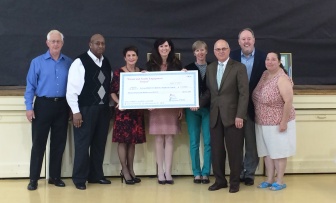
8. Donna Davidson was named one of the top 50 nonprofit leaders in Atlanta in 2015 by the Atlanta Business Chronicle. 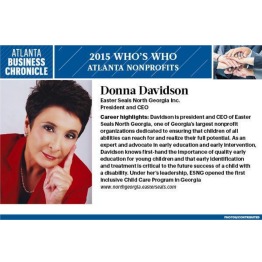
9. Grandpa George Richardson was recognized on Veterans Day for his service. Our Foster Grandparent program is such a great way for seniors to stay involved in their community and, at the same time, children learn from seniors and all that they have to offer. Grandpa Richardson (one of the 100 seniors that volunteer at area child care centers) was recognized for his service to our country by Senator Loudermilk on Veterans Day. Read more about this program.

10. Last year we reflected on how far the country has come since the passage of the Americans with Disabilities Act 25 years ago. While we are still working to make improvements for the lives of so many Georgians with disabilities, we should also celebrate our accomplishments. Read more. ![]()
And one to grow on – Easter Seals has been serving residents of Georgia for 65 years – here’s to another successful year of raising disability awareness and educating and supporting our children so they will be successful in school and life.
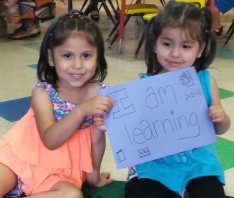
May Wrap Up Link Party
Since its inception, the goal of Easter Seals is to provide programs and services to families with children that require special care. At Easter Seals North Georgia, we do this through education and care. I particularly like May – not just for the weather – because it reminds everyone the importance of health and education. Cause awareness serves as a reminder that these issues affect many people in our community. To have a prosperous, self-sufficient community, we need to make sure everyone is educated, healthy and empowered!
Check out these links for tips and resources ICYMI…
Health:
Mental Health Awareness – article contributed by ESNG’s Mental Health Manager Juanita Brigman
Better Speech and Language Month – article contributed by ESNG’s Speech Therapist Cristina Jones
Women’s Health Week – resource for women to be healthy at any age
Education:
Teachers Appreciation Week – meet some of our great teachers
Prevent Summer Brain Drain – some tips and resources for the summer
General awesomeness:
ESNG’s President/CEO Donna Davidson Receives The 2015 Medder’s Award
The Importance of Women’s Health
Between Mother’s Day and Women’s Health Week, May is centered around women. Generally speaking, women are the center of our lives. Our moms are the very first people to love us. Without them, we would literally not exist. Yet, their health isn’t always their priority – between work, family, life. Let’s take a minute to remind our moms, grandmothers, aunts, nieces, cousins, neighbors and besties to take this week to think about the importance of their health.
Women in particular need to keep an eye on their physical and mental health, because if we’re scurrying to and from appointments and errands, we don’t have a lot of time to take care of ourselves. We need to do a better job of putting ourselves higher on our own ‘to do’ list – First Lady Michelle Obama
Now, we’re not asking you to drop everything you do and go run a marathon. If you do, that’s great! Do you take 15 minutes out of your day to focus on you? Maybe that’s going for a walk, reading, doing a hobby, catching up with a friend…the list is yours to make. While you are making your list, why don’t you add your annual physical with your doctor on there. If your a mom, remember how you were so good about making your child’s wellness check ups? Those are important for you, too. You need to be hitting your milestones in your 20s, 30s, 40s and so on.
Don’t forget b eing healthy isn’t just your body, it’s also your brain and emotions. Coincidentally, May is Mental Health Awareness Month. Being a woman is a lot to handle. Make sure you are handling it well. Talk to your doctor if you feel like you need help. Trust us, it’s okay to ask for help!
eing healthy isn’t just your body, it’s also your brain and emotions. Coincidentally, May is Mental Health Awareness Month. Being a woman is a lot to handle. Make sure you are handling it well. Talk to your doctor if you feel like you need help. Trust us, it’s okay to ask for help!
Well, ladies, we hope you enjoy this month that’s all about you. You deserve it. Don’t forget to take care of yourself. You may feel and act like Wonder Woman, but don’t forget that she was part of a team.
Some great resources:
http://www.womenshealth.gov/nwhw/
http://www.cdc.gov/women/nwhw/
http://www.mentalhealthamerica.net/may-mental-health-month-0
https://www.nami.org/mhm


